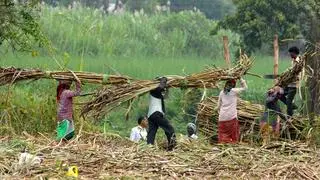Calling for a change in the narrative, President Droupadi Murmu on Monday said the agriculture sectorhas got a a lot to do with regards gender justice, globally. She appealed to global scientists to make agri-food systems more just, inclusive and equitable.
Inaugurating a four-day global conference on ‘From research to impact: Towards Just and Resilient Agri-Food Systems’ in New Delhi, jointly organised by the Consortium of International Agricultural Research Centres (CGIAR) and Indian Council of Agricultural Research (ICAR), President Murmu said that the Gender Impact Platform of CGIAR has been working on putting equality and inclusion at the heart of food systems research by focusing on women, not as the objects of transformation but as the agents and drivers of the transformation.
However, she also said, “Women sow, grow, harvest, process and market our food. They are indispensable in making every grain reach from farm to plate. But still, across the world, they are held back and stopped by discriminatory social norms and barriers to knowledge, ownership, assets, resources and social networks.
“Their contribution is not recognised, their role is marginalised and their agency is denied in the whole chain of the agri food systems. This story needs to change.”
Changes
President Murmu, in an indirect reference to the recently passed Women Reservation Bill, said that India has been witnessing some changes as women get more empowered through legislative and governmental interventions. “There are many stories of women turning into successful entrepreneurs in this (farm) sector,” she said.
Bulk of the women are kept at the bottom of the pyramid of the agriculture structure and they are denied the opportunities to climb the ladder and assume the role of decision-makers, she said and added that the Covid-19 pandemic brought to the fore a strong correlation between the agri-food systems and structural inequality in society.
Highlighting that the farm sector remained resilient during Covid-19, the President also said that compared to men, women suffered more job loss in the pandemic years that triggered migration.
Pitching for giving land ownership right to women, President Murmu said though women are unpaid workers, tillers, farmers in the field, but not owners of the land.
Stressing that climate change is an existential threat, she said the clock is ticking and there is a need to act now, fast and swiftly. “On one hand, climate change, global warming, melting ice caps and extinction of species are disrupting the food production. On the other hand, the agri-food cycle is not sustainable and eco-friendly. It is hindering climate action and causing an increase in greenhouse gases.
“Hence, our agri-food systems are stuck in a vicious cycle. We need to break this chakravyuh. At the same time, we need to increase biodiversity and restore ecosystems so that food and nutritional security can be assured through the agri-food systems along with a more prosperous and equitable future for all,” she said.







Comments
Comments have to be in English, and in full sentences. They cannot be abusive or personal. Please abide by our community guidelines for posting your comments.
We have migrated to a new commenting platform. If you are already a registered user of TheHindu Businessline and logged in, you may continue to engage with our articles. If you do not have an account please register and login to post comments. Users can access their older comments by logging into their accounts on Vuukle.